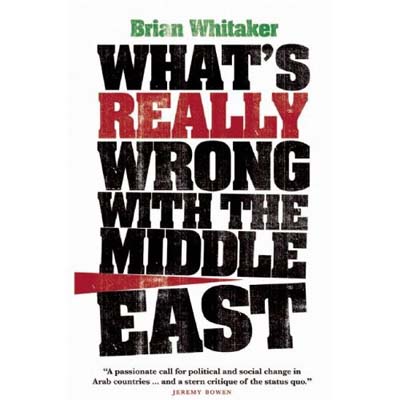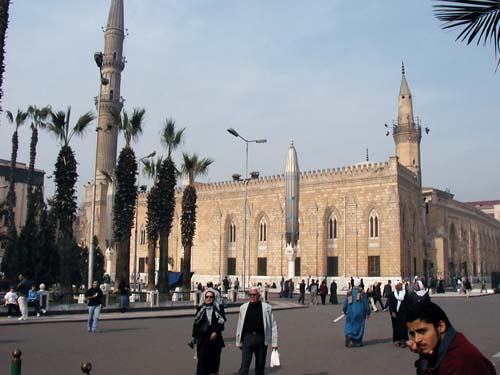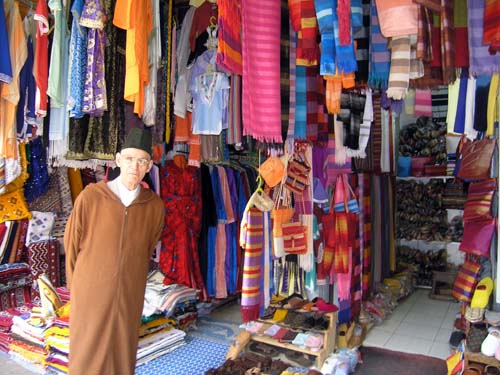It's not a question. It's a statement of fact.
Brian Whitaker spills the beans and explains why in his book of the same title, with an emphasis on "really."
One knows from the introduction that this is a writer willing to rattle a few cages, and he does it while documenting his claims, and proposing remedies for wrongs he feels can be rectified.
"The problems of the Middle East are always somebody else's fault. While the west blames dictators and extremists, Arabs often turn the tables, blaming centuries of foreign interference. Both sides are right, up to a point, but they both also ignore a large part of the picture," he wrote.

Whitaker said he aimed to prompt debate: among Arabs themselves, about change, and about western policy towards the Middle East.
It's no easy task, given the complications involved, the layers of history, the fractured geography, the countless conflicts, and the people in question.
For starters, the author didn't just rely on the usual cast of Western-based think tank "talking heads," or local politicians and officials with their own axes to grind, but drew instead on interviews with "independent-minded" people who have formed their own opinion about what is wrong."
Whitaker also capitalized on his extensive experience as former Middle East correspondent and editor for the British daily The Guardian and his rich background in Arab and Islamic affairs.
The detailed and well-documented (but by no means definitive) 384-page book published by Saqi picks at sores like the lack of critical thinking - with the education system mostly reliant on rote learning - the stifling family hierarchy and tribal/feudal structures, the longevity of Middle East rulers, religion's hold on people and politics, and, hostility to globalization, to name a few issues.
Rote learning has advantages - as in foreign language vocabulary - but in Arab educational systems, "dominates to the exclusion of understanding, analytical thought, problem-solving and so on," Whitaker explained.
He added that it reflects the authoritarian tendencies of Arab society and regimes' desire to avert critical scrutiny.
Among others, Whitaker pointed to the late "modern" Palestinian-American thinker Hisham Sharabi, who critiqued his own society, noting that social sciences didn't blossom as full-fledged disciplines until the 1960s and 1970s.
In a chapter entitled "States without citizens," Whitaker quotes American University of Beirut professor Karim Makdisi as saying: "The state represents something which is almost always negative, and this is something throughout the Arab world. No one looks up to the state as something positive. You survive, and you live, and you get through, in spite of the state. That's the relationship."
 Brian Whitaker
Brian Whitaker
Makdisi, and Whitaker, put their finger on the reality that most Arab regimes lack legitimacy, and, that the rare few that were freely elected, must justify their existence in a sea of other considerations.
"The typical Arab regime is both authoritarian and autocratic - authoritarian because it demands obedience and discourages questioning; autocratic because power is highly centralized and concentrated around the head of state," Whitaker said.
Another glaring fault line is the controversial issue of religion and how it has become known as the "Arab malaise," he wrote, adding that millions of adherents find comfort and hope in a world of doubt and despair.
 Al Hussein neighborhood in Cairo's Islamic center (Abu-Fadil)
Al Hussein neighborhood in Cairo's Islamic center (Abu-Fadil)
While Arabs are often quoted as saying that "Islam is the solution" to all problems, other religions have also been used as crutches when all else has failed.
"If the purpose of religion is to serve the spiritual and moral needs of people, it is reasonable to ask what purpose is served by states having a religion," Whitaker posited.
He doubted much thought was given to the matter when Arab constitutions were written, and that governments never imagined they would be in a battle for survival with "well-organized Islamist opposition movements."
On to "Vitamin W," a chapter on "wasta," loosely translated as connections or influence, or what the French often call "piston" in all its corrupt permutations.
Whitaker quotes Egyptian psychiatry professor Aida Saif al-Dawla as saying corruption is a top-down affair and that for corrupt senior level officials to ensure their survival, they must corrupt their underlings.
In another example provided by former European Commission director-general for development Dieter Frisch, the peak of perversion is when government priorities are shaped in a way that generates the greatest personal gain for decision-makers - "as in the case of the Lebanese law that helped a minister sell fire extinguishers."
While Arab states come up with occasional anti-corruption drives, they're patchy, not systematic, and are often part of a political game, Whitaker mused.
Besides all the wounds, self-inflicted or perpetrated from the outside, the region also suffers from an identity crisis.
The nomenclature "Middle East" is loose. Some people in the west have called the region the "Near East."
Others have included non-Arab countries and gone as far as Afghanistan to call it the "Greater Middle East," and yet others have thrown North African countries into the mix, although geographically, they're neither middle, nor in the east.
 Casablanca, Morocco, market is not in the Middle East (Abu-Fadil)
Casablanca, Morocco, market is not in the Middle East (Abu-Fadil)
In the last chapter, "Escape from History," Whitaker turned his barbs to the west, noting that given the history of western powers' involvement in the Middle East, it is not surprising many Arabs view everything the west does with deep suspicion, and would rather they just backed off.
But he does not despair.
The author suggests assisting the development of freedom in depth - personal liberties, respect for human rights, equality of opportunity, etc.
"In order to have credibility, though, efforts to promote freedom in depth must pass the sincerity test, and so western countries have to be seen upholding the values they preach," he wrote.
Credibility also requires a balanced approach that does not discriminate between friendly and unfriendly regimes - their political practices or disrespect for human rights - by abandoning the old patron-client relationship.
Change is coming, he concluded, but there's no telling how long that will take.
